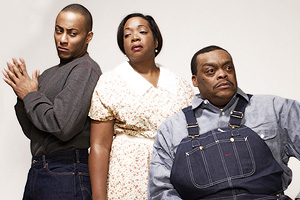Court Theatre is bringing Wilsonís acclaimed Fences to South Side stage
By Jennifer CarnigNews Office
 Anthony Flemming III, Jaqueline Williams and A.C. Smith will appear in August Wilsonís Fences at Court Theatre, during its run from Thursday, Jan. 12 through Sunday, Feb. 12. |
|
Just three months after acclaimed playwright August Wilson’s death, Court Theatre is honoring his life and contributions to the American literary canon by putting on a production of one of his most celebrated works.
Fences, which opens Thursday, Jan. 12, and closes Sunday, Feb. 12, was Wilson’s second play to go to Broadway, and it won him the 1987 Pulitzer Prize for Drama. It is part of an entire cycle of plays that Wilson penned conveying the African-American experience in the United States in each decade of the 20th century. Fences is his treatise on being black in the 1950s.
Beginning in 1957, between the Korean and Vietnam wars, Fences ends in 1965, but the themes of the play place it squarely in a pre-civil-rights era, pre-Vietnam War society. The story is set during the season Hank Aaron led the Milwaukee Braves to the World Series.
Troy, a former Negro League baseball player, too old to play by the time the major leagues finally integrated, is a bitter garbage collector. The son of a southern sharecropper, Troy moved north to Pittsburgh during the Great Migration, but never really found the land of opportunity he imagined. A story of dreams lost, racism, family struggles, infidelity, work, marriage, violence, mental illness and the suffering of war veterans, Fences is a “meaty, timely” story that holds a lot of parallels to contemporary American society, said Ron OJ Parson, director of Court Theatre’s production.
“These are issues that go beyond racial lines,” Parson said. “I think one of the things that makes this play so special and so meaningful to so many different people is that it is just a story about a family. Granted, this family has particular issues because they are black Americans, but the family could be any race because all families have issues and struggles they have to deal with.”
Parson said this show is unique not only because it is the first major Chicago production of a Wilson play since the writer passed away in October, but because it is being performed on the South Side and the cast is made up entirely of local actors.
“I think that’s important for several reasons,” Parson said. “First, I think it’s really saying something about the amount of talent in this city. There are no better actors anywhere than those we have in Chicago.
“But it’s also important,” he continued, “because of the issues brought up in this play. There are a lot of subjects here that we should be talking about. My hope is that Fences will help us enter into that conversation.”
To facilitate that discussion, the Division of the Humanities is co-sponsoring a symposium free and open to the public on Thursday, Jan. 26, through Sunday, Jan. 29. Among the events planned are three after-show panel discussions, including Parson and the cast, as well as community leaders, prominent directors, and faculty from English Language & Literature and the Center for the Study of Race, Politics and Culture.
Topics planned for discussion include a question-and-answer session about Court’s particular interpretation of Fences, a discussion about Wilson’s contributions to the American literary landscape, and an exploration centered around issues of family with a focus on Fences’ estranged father-son relationship and the notion that burdens can be passed on from one generation to the next.
“This is a very appropriate time to sink our teeth into these issues and this play,” Parson said. “All of August Wilson’s plays are classics, but I think that the timing of his death, with us performing this particular play, really lends a spiritual aspect to this production. As soon as we walk into work, the spirit permeates through us and through the theater. It’s like it was meant to be.”
For more information about Fences or the symposium, visit www.courttheatre.org or call (773) 702-7005. For ticket information, call the Court Theatre box office at (773) 753-4472.
![[Chronicle]](/images/sidebar_header_oct06.gif)